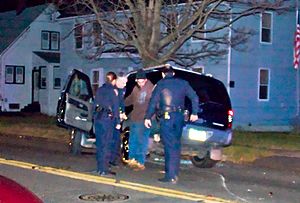Drunk driving facts for kids
Drunk driving (also called drink driving in places like the UK and Australia) is when someone drives a vehicle like a car or truck after drinking too much alcohol. It's very dangerous and against the law in most parts of the world. In some places, even riding a bicycle while drunk is illegal.
Many places that make laws first had rules about "driving while intoxicated" (DWI), which only covered alcohol. Later, most changed these to "driving under the influence" (DUI) laws. These new laws also included driving while affected by other drugs. If someone is caught driving while impaired, there are serious consequences. The specific rules are different in various countries.
Contents
What is the Legal Limit?
Most countries have a "legal limit" for how much alcohol can be in a driver's body. This limit is usually measured as blood alcohol concentration (BAC). If a driver's BAC is at or above this limit, they are breaking the law, even if they feel okay to drive.
Legal Limits in the United States
In the United States, for drivers who are 21 years old or older, it's illegal to drive with a BAC of 0.08% or higher. This means there are 8 grams of alcohol in every 10 liters of blood. For drivers under 21, the legal limit is much lower, sometimes even 0.00% (meaning no alcohol at all). Stricter limits also apply when driving boats, airplanes, or large commercial vehicles.
All US states have "implied consent" laws. This means that if you have a driver's license, you automatically agree to take a breathalyzer test or a similar test if a police officer asks you to. This test helps them find out your BAC.
Legal Limits in Canada
In Canada, it became illegal in 1969 to drive with a BAC higher than 80 milligrams of alcohol in 100 milliliters of blood. It also became illegal to refuse a police officer's request for a breath sample. Breaking these laws can lead to large fines and even time in jail.
Some Canadian provinces have a "zero-tolerance" rule for new drivers. This means new drivers cannot have any alcohol in their system while driving. For example, in Ontario and British Columbia, new drivers cannot have any alcohol. In other provinces, drivers under 22 might face a 30-day driving ban and their vehicle might be taken away for 7 days if they have any alcohol in their system.
Legal Limits in the United Kingdom
In the United Kingdom, it's a crime to be "drunk in charge" of a motor vehicle. This means you can be in trouble even if you're not actively driving, but are in or near the car and have access to the keys. Someone in the passenger seat could also be charged if police think they were driving or were likely to drive.
In England, Wales, and Northern Ireland, the legal limit is 0.08% BAC. In Scotland, it's 0.05% BAC. If you drive or try to drive over this limit, you could face up to six months in prison, a fine of up to £5,000, and a driving ban for at least 12 months. If you get caught a second time within ten years, the driving ban is at least three years.
It's also against the law to refuse to give a breath, blood, or urine sample for testing. The consequences for refusing are the same as for drunk driving itself.
Legal Limits in Australia
In Australia, road laws are set by each state or territory, but they all have similar rules. The general rule is that a driver's BAC must never be more than 0.05 grams of alcohol in every 100 milliliters of blood. Some drivers, like new drivers, have even lower limits.
Australian police officers can stop any driver and perform a random breath test without needing a specific reason. They can set up roadblocks in places like town centers on weekend nights or after big events. At these roadblocks, every driver is tested. This is different from the UK and US, where police usually need a reason to suspect drunk driving before asking for a test. In Australia, refusing to give a breath sample is a serious offense and can lead to severe consequences, including jail time.
Images for kids
 | Kyle Baker |
 | Joseph Yoakum |
 | Laura Wheeler Waring |
 | Henry Ossawa Tanner |




